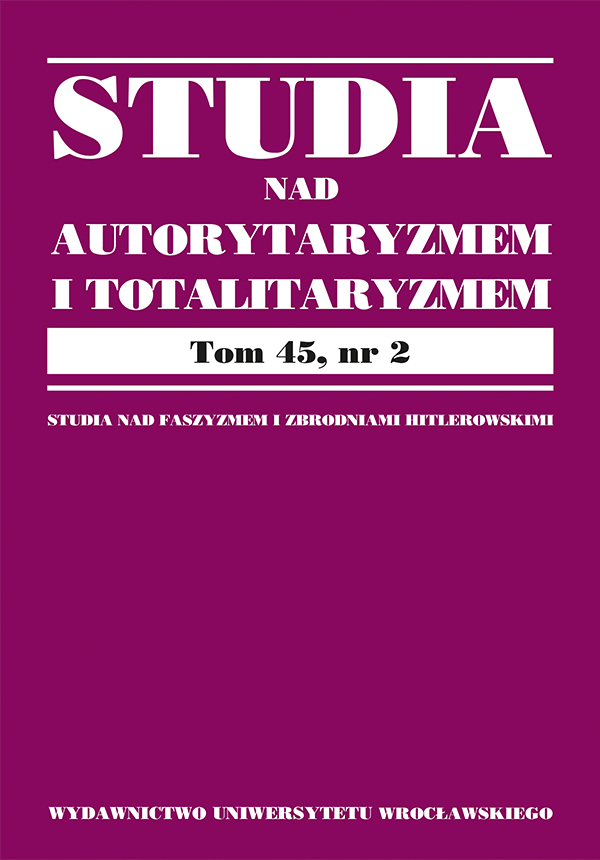

Artykuły

The present article outlines the conflict between the representative of the pro-Kremlin part of the Russian minority in Latvia and the local political community. The case will be presented in the broader context of the problems that emerge due to the constitutionalisation of new democratic communities after the fall of communism, the issues of the rule of law together, with questions of its unlimited inclusiveness. By discussing the case of Tatiana Zhdanok in a broad socio-political and historical context, it will be possible to reflect on Central European dilemmas concerning the values considered to be leading within the political community.
Aasland A., Citizenship status and social exclusion in Estonia and Latvia, „Journal of Baltic Studies” 33, 2002, nr 1, s. 57–77.
Bilinsky y., Toward the West: Baltic realignment and Russia’s reply, „Harvard International Review” 28, 2006, nr 1.
Bowring B., Fragmentation, “lex specialis” and the tensions in the jurisprudence of the European Court of Human Rights, „Journal of Conflict & Security Law” 14, 2009, nr 3, s. 485–498.
Connerton P., Jak społeczeństwa pamiętają, przeł. M. Napiórkowski, Warszawa 2012.
Cyuńczyk F., Konstytucyjne ramy pamięci? Narracje pamięci w preambułach do konstytucji państw postkomunistycznych, [w:] Nowy konstytucjonalizm. Polityczność, tożsamość, sfera publiczna, red. A. Czarnota, M. Paździora, M. Stambulski, Warszawa 2021.
Hobsbawm E., Wiek skrajności. Spojrzenie na krótkie XX stulecie, Warszawa 2018.
Hoogers H.G., Ždanoka v. Latvia — European Court of Human Rights: The boundaries of the right to be elected under Article 3 of the first Protocol to the European Convention on Human Rights. Judgment of 16 March 2006, Ždanoka v. Latvia, „European Constitutional Law Re- view” 3, 2007, nr 2.
Īvāns D., Januar 1991 Barrikaden in Lettland, Berlin 2021.
Jarlik R., We Carried Out the People’s Will, Tallin 2014.
Kelemen R., Pech L., Why autocrats love constitutional identity and constitutional pluralism: Lessons from Hungary and Poland, Reconnect Working Paper no. 2 — September 2018.
Krūma K., Checks and Balances in Latvian Nationality Policies: National Agendas and International Frameworks, red. R. Bauböck, B. Perchining, W. Sievers, Amsterdam 2009.
Kudera M., Zachód porwany albo tragedia Europy Środkowej, „Zeszyty Literackie” 1984, nr 5.
Lasas A., Bloody Sunday: What did Gorbachev know about the January 1991 events in Vilnius and Riga?, „Journal of Baltic Studies” 38, 2007, nr 2.
Łętowska E., Kilka uwag o praktyce wykładni, „Kwartalnik Prawa Prywatnego” 11, 2002, z. 1. Matthes C.y., Latvia, [w:] From Eastern Bloc to European Union, red. G. Heydemann, K. Vodička, New york-Oxford 2017.
Misztal B., Theories of Social Remembering, Maidenhead 2003.
Młynarska-Sobaczewska A., Autorytet państwa. Legitymizacyjne znaczenie prawa w państwowej transformacji ustrojowej, Warszawa 2010.
Parta R.E., Under the Radar: Tracking Western Radio Listeners in the Soviet Union, Budapest 2022.
Pleps J., Foreign precedents in the case-law of the Latvian Constitutional Court, „European Journal of Public Matters” 2017, nr 1, s. 21–35.
Přibáň J., Legal Symbolism: On Law, Time and European Identity, Hampshire 2007.
Pridham G., Post-Soviet Latvia — a consolidated or defective democracy? The interaction between domestic and European trajectories, „Journal of Baltic Studies” 4, 2009, nr 4, s. 465–494.
Pridham G., Securing the only game in town: The EU’s political conditionality and democratic consolidation in post-Soviet Latvia, „Europe-Asia Studies” 61, 2009, nr 1, s. 51–84.
De Schutter O., Ringelheim J., Ethnic profiling: A rising challenge for European human rights law, „The Modern Law Review” 05.2008, t. 71, nr 3, s. 358–384.
Ziemele I., State Continuity and Nationality: The Baltic States and Russia: Past, Present and Future as Defined by International Law, Leiden-Boston 2005.